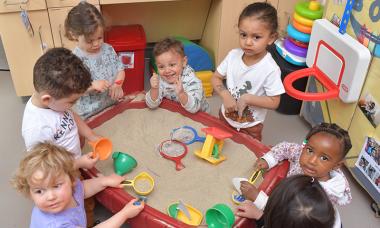
Some say it takes a village to raise a child. In Worcester and its surrounding communities, parents, care providers, and community leaders play important roles in early childhood learning and development. They often work together to support children in the first few years of life. Yet, doing so has been difficult at times — consider what life was like for families in the middle of the COVID-19 pandemic.
Since in-person contact was limited and parents and children were forced to stay home for long periods of time, many families faced unprecedented challenges. Escalating housing costs, food insecurity, mental health issues, and many other problems tested the resilience of families during the pandemic. These problems also highlighted the need for civic engagement, as it became more critical than ever before for parents, care providers, and community leaders to work together to support the growth and development of young children.
Strategies for Children (SFC) launched The Early Childhood Agenda to help address these problems and many others. Recently, we sat down with Amy O'Leary, SFC's Executive Director, and Marisa Fear, SFC's Director of Policy, to learn more about the agenda, its origin, and its potential impact on families and care providers in Massachusetts.
Improving the Lives of Children in Massachusetts

The Early Childhood Agenda was developed in response to the COVID-19 pandemic, when issues like food insecurity, housing, mental health, and many others had a significant impact on young children and families across the Commonwealth. For SFC, the crisis heightened the need to expand its role as a convener and connector among many groups focused on the early childhood system.
"There's an early childhood connection in every area, and the agenda helps us create cross-sector partnerships and opportunities for alignment in these areas," Marisa says.
Edward Street and other community partners have worked together to develop the agenda virtually through SFC's The 9:30 Call, an early childhood Zoom call that takes place Monday through Thursday from 9:30-10:00 a.m. We recognize that we must be intentional about community resources and make it as easy as possible for anyone to access them. That way, young children and their families will be able to access resources for childcare, early learning, healthcare, housing, food, and more.
"We're focusing on 10 challenges that the community faces, prioritizing them, and starting to identify solutions," Marisa notes. "These are driven by people with lived experience and those who are closest to the work."

In October 2022, the agenda officially began. Last August, community partners finalized 10 priorities across five focus areas:
- Financially Secure Families
- High Quality Experiences
- Thriving Early Childhood Workforce
- Robust System Infrastructure and Local Partnerships
- Healthy Beginnings
The agenda aims to help lower the cost of early education and care for families, make it easier for them to take advantage of tax credits, and lift children out of poverty.
The agenda recognizes the importance of high quality experiences for optimal growth and development of young children. To help support these experiences, the agenda will make tools related to developmental monitoring, universal screening, evaluations, referrals, transitions, and timely delivery of services generally available to families.
The agenda will establish a career pathway for early childhood professionals. It will also create a specific course of action to help these professionals receive competitive wages and benefits.
The agenda will build on a landscape analysis of local efforts and consider early education and care best practices. At the same time, it will foster a plan to create local infrastructure for early childhood.
The agenda will expand access to and establish a vision for specific roles relating to health and early childhood, strengthening the link between the two.
We will focus on these areas for the next two years, making sure that every family in the Commonwealth can consistently access high quality early childhood programs and services. Also, we will create a strong early childhood system that helps kids build neural connections and promotes healthy brain development in the initial years of a child's life.
The Future Looks Bright

Edward Street and our community partners are committed to building a strong, accessible early childhood system in Massachusetts. As part of our efforts, we are leading Workgroup #6, which focuses on local infrastructure and partnerships that make early childhood work in communities.
"The work that Edward Street has done in Worcester sets a great example on how to pull a community together is great," Marisa says.
We will highlight Workgroup #6 in an upcoming blog post — stay tuned for more details.
Along with this, we keep looking for ways to get better and are exploring partnerships and opportunities that benefit families and care providers across the Commonwealth.
"Continuous improvement is something we've been mindful of," Marisa notes. "We're at different tables through the agenda and the governor, and there's the potential for engagement opportunities to continue where we keep adding value."
Read our blog and follow us on Facebook and LinkedIn for updates on the agenda, its workgroups, and other early childhood initiatives, programs, and news in Central Massachusetts.
